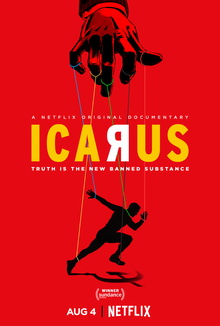
I have zero interest in sports so a documentary about doping in the world of cycling is hardly something that I’m likely to get excited about. However while this was director Bryan Fogel’s original plan for his film, subsequent events played out in a way that must have been far beyond anything he could have predicted, and so he seemed to have pivoted his film in response. The result is a riveting watch that tests the boundaries of what documentaries are supposed to be.
After Lance Armstrong confessed to using performance enhancing drugs, filmmaker and amateur cyclist Fogel decided to see if he could use similar drugs to improve his own performance in the amateur Haute Route event and get away with it. He tries at first to get help from American specialists but they are reluctant to get involved and he is eventually introduced to Russian doctor Grigory Rodchenkov. He turns out to actually be the director of Russia’s national anti-doping laboratory and is more than happy to assist Fogel. He even visits Fogel in the US to collect his urine samples and brings him to Russia to visit his laboratory. Continuing investigations by sports authorities however reveal Rodchenkov’s central role in Russia’s state-sponsored doping program and he confesses everything to Fogel, including how Russia swapped urine samples during the Sochi Winter Olympics. Realizing that Rodchenkov’s life is in danger, Fogel helps him escape to the US, break his story to the media and work with the US authorities.
Traditionally documentaries document. We think of them as a passive presentation or record of events, past or present. Icarus however is clearly different as Fogel is an active participant in what is happening. Rodchenkov opens up to him about a conspiracy of global import to such an extent that Fogel seems to be in as much danger as Rodchenkov due to Vladimir Putin’s attempts to shut down this line of inquiry. Fogel even stands in for Rodchenkov when presenting the accumulated evidence and testimony to the World Anti-Doping Agency as the latter fears for his life should he appear in person. Given that two of his friends and colleagues have already died under mysterious circumstances, his fear seems far from idle. The film doesn’t state this explicitly but it seems clear that Fogel even helps Rodchenkov with such mundane matters as buying air tickets and providing him with a place to stay in the US. It’s extraordinary to watch all this unfold around Fogel and surreal to think that it all started with him wondering if he could dope himself for his cycling events.
There’s little reason to doubt that the truth is, if anything, is much worse than what we see here and that the sports authorities are actively complicit in hiding or downplaying the worst scandals in order to protect their reputations. Fogel tries not to get into the politics and avoids commenting on the motivations of the Russian government for orchestrating the cheating or the International Olympic Committee for not coming down as hard on them as they should. But we can read between the lines and to me this makes the film feel even more factual and convincing. However I don’t like how the film uses George Orwell’s 1984 as a sort of recurrent motif. I suspect that this is mostly due to Rodchenkov who seems to actually relish, to some extent, being in the middle of this cloak-and-dagger affair and plays it up for dramatic effect. It seems unnecessarily theatrical and feels incompatible with the more straightforward approach in the earlier parts of the film.
Perhaps the most fascinating thing about this project is why Rodchenkov chose to help Fogel with his amateur doping efforts and later confessed everything to him, a private individual. Rodchenkov claims that he feels guilty as he believes that by helping Russia sweep the Sochi Olympics, he emboldened Putin to invade Ukraine. Yet why did he pick Fogel instead of handing himself over to US authorities or contact a respected journalist to break the story? In any case, it seems like Fogel stumbled into a far bigger story than he ever expected, resulting in a documentary that is quite unlike anything else I’ve ever watched. It seems inevitable that it won the Oscar for Best Documentary and I consider it an obligatory watch even if you have no interest in sports.